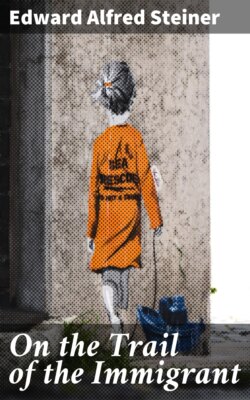Читать книгу On the Trail of the Immigrant - Edward Alfred Steiner - Страница 5
На сайте Литреса книга снята с продажи.
ОглавлениеThey rose to where their sovran eagle sails,
They kept their faith, their freedom, on the height,
Chaste, frugal, savage, arm’d by day and night
Against the Turk; whose inroad nowhere scales
Their headlong passes, but his footstep fails,
And red with blood the Crescent reels from fight
Before their dauntless hundreds, in prone flight
By thousands down the crags and thro’ the vales.
O smallest among peoples! rough rock-throne
Of Freedom! warriors beating back the swarm
Of Turkish Islam for five hundred years.
Great Tsernogora! never since thine own
Black ridges drew the cloud and brake the storm
Has breathed a race of mightier mountaineers.
From Lithuania, a province of Russia, come smaller groups of non-Slavic emigrants; people with an old civilization of which little remains, and with a language which leans closest to Sanscrit, yet who, because of their subjection to Russia, have sunk to the level of the Russian peasants. Then there are Magyars and Finns, rather close kinsmen, who because one lives in the South and the other far North, are as different as the South is from the North; Greeks and Syrians, traders all of them and workers only when they must be. We shall follow them more closely as they pass into our own national life.
The Italian emigration, the largest which we receive from any one source, comes primarily from Southern Italy, from the crowded cities with their unspeakable vices; the smallest number of emigrants come from the villages where they have all the virtues of tillers of the soil. The most volatile of our foreign population, and perhaps the most clannish, they represent a problem recognized by their home government, which was the first to concern itself with it, to study it systematically, and to aid our government so far as possible in a rational solution. The number of Italian emigrants is still undiminished, and in spite of the fact that in recent years more than 200,000 of them have annually left their native land, their withdrawal is scarcely felt and the number could be doubled without perceptible diminution at home.
There are then upon this immigrant trail, many people of varied cultural development; some of them coming from countries in which they have been part of a very high type of civilization, while others come from the veritable back woods of Europe, into which neither steam nor electricity has entered to disturb the old order, nor has yet awakened a new life.
None of them starts for America tempted by wealth which can be picked up in the streets. That mythical man who, upon landing, refused to take a quarter from the side-walk, because he had heard that dollars were lying about loose, in America, has found it true because he has gone into politics.
The immigrant of to-day, be he Slav, Italian or Jew, starts upon this trail, with no culture, it is true, but with a virgin mind in which it may be made to grow. Not always with a keen mind, but with a surplus of muscle, which he is ready to exchange at the mouth of the pit or by the furnace’s hot blast, for a higher wage than he could earn in the miry fields of his native village;—but it is by no means settled who gets the best of the bargain.
